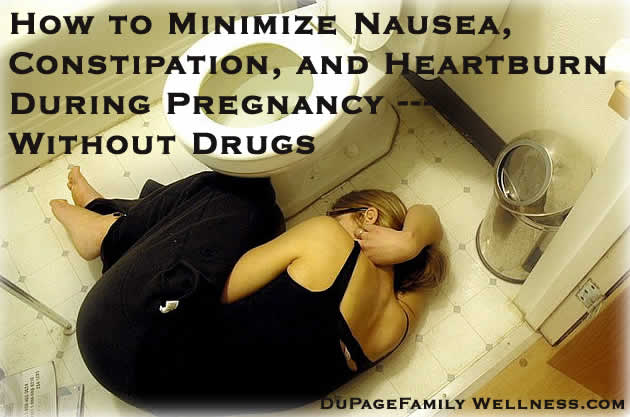Pregnancy Series Part 2: Pregnancy and Digestion
Naturally Minimizing Nausea, Constipation, and Heartburn
 Before we get into the specifics of pregnancy and digestion, for anyone wanting a healthy pregnancy, first following the diet and lifestyle components that we discussed in the first post is critical. In fact, often doing those things will eliminate these other common pregnancy complaints.
Before we get into the specifics of pregnancy and digestion, for anyone wanting a healthy pregnancy, first following the diet and lifestyle components that we discussed in the first post is critical. In fact, often doing those things will eliminate these other common pregnancy complaints.
Ok, back to pregnancy and digestion. Because each of these digestive conditions are unique and have different causes in the body, we will cover ways to naturally minimize nausea, constipation, and heartburn individually.
Nausea
This unfortunate side effect in pregnancy is experienced by up to 90% of pregnant women ranging from food aversions, nausea, and vomiting, according to Midwife Meghanne Reburn. Thankfully, this symptom is typically constrained to the first trimester and can by managed with some easy actions.
The most common argument for why pregnant women experience nausea and food aversions are to protect themselves from potential unwanted toxic or harmful food that could affect the growing baby. The most common aversion that women experience is to meat, which is the place that the most bacteria and parasites would reside in the food of our ancestors before modern storage techniques were developed. The body, in its genius, knows that these are potentially harmful substances and through aversions and nausea specifically lets the woman know to stay away! This is why women have a hypersensitive sense of smell during pregnancy, so they can sniff out any potentially rotten food to avoid. However, we know that meat is an important part of a healthy diet so check out the helpful food tips at the bottom for ways to include more protein in your diet.
Additionally, women tend to experience more drastic symptoms of nausea when blood sugar levels are low. In general, the blood sugar levels in pregnant women run higher than normal to supply enough energy to the growing baby. Therefore, when blood sugar drops, the body uses nausea to signal to the woman to eat because the baby needs some more fuel. Because of this, it is important that during pregnancy to not let yourself get too hungry as this could cause a sudden and unwanted bout of nausea and sickness.
Helpful Food Tips to Reduce Symptoms of Nausea:
- Always carry snacks with you to prevent yourself from getting too hungry (nuts, hard boiled eggs, veggies and guacamole, or fruit with nut butter are good options)
- Creamy foods tend to be easier for women to tolerate in the first trimester – I lived off of cauliflower mash, full fat yogurt, avocado pudding, and baked sweet potatoes with butter.
- Scrambled eggs are a good alternative to meat. Extra yolks are great for adding important nutrients.
- Smoothies made with full fat coconut milk, nuts or nut butter, fruit, greens, and some gelatin to keep blood sugar stabilized.
- Sip on some bone broth throughout the day is a great way to increase nutrients and avoid nausea.
- Small amounts of ginger root have been known to be effective in reducing nausea.
Constipation
That’s right, we are going to talk about poop. Pregnancy related constipation effects around 40% of women at some point. This constipation is caused by those lovely pregnancy hormones, specifically progesterone. During pregnancy, your body produces more progesterone. The main job of progesterone during pregnancy is to relax muscles. The relaxing effects of progesterone balance out the muscular uterus and prevent you from going into premature labor. A very important and necessary job! Unfortunately, progesterone’s muscle relaxing powers can also have the same affect on other parts of the body, like relaxing the muscle contraction (peristalsis) of the colon. Peristalsis contributes to easy to pass stools, so when it is relaxed; those stools have a harder time coming out.
What can I do about it?
- Remove processed foods to help your bowels function most efficiently
- Drink plenty of water, which helps to make stools softer and easier to pass
- Engage in light exercise like walking or yoga, this can stimulate peristalsis and more regular bowel movements
- Magnesium supplementation stimulates peristalsis by drawing water into your bowels. I’ve had tremendous success with Natural Calm Magnesium sold at most health food stores. With magnesium supplementation, start small (begin with 1/2 tsp and work your way up to 2 tsp) if you notice loose stools, lower your dose.
- Healthy gut flora can aid bowel movements tremendously. You can increase your beneficial gut flora by eating plenty of probiotic rich food like whole milk yogurt, kefir, or sauerkraut and taking a quality probiotic supplement.
Heartburn
That darn progesterone is at it again, this time moving its relaxing powers to the esophageal sphincter. This is the muscle between your esophagus and your stomach that ensures that once food is swallowed, it stays in the stomach along with all of the acid in the stomach needed for proper digestion. When progesterone relaxes this sphincter, it can cause it to open letting acid from the stomach up into the esophagus (aka heartburn). This, in combination with the growing baby pushing up on your stomach leaving a smaller area for food cause this very common pregnancy system, especially later in gestation.
It is important to remember that heartburn is not caused by the stomach producing too much stomach acid. This acid is crucial for the proper digestion of food. The heartburn is simply caused by the relaxation of the sphincter that holds that acid where it should. Therefore, I would not suggest taking antacids or other heartburn medication as this can cause poor digestion and sub optimal ability for the body to absorb nutrients. Check out this great video to learn more about the importance of stomach acid in digestion.
Instead, try these simple tips to help keep heartburn at bay:
- Eat smaller meals throughout the day to prevent excess food in the stomach and a greater likelihood of heartburn.
- Avoid drinking with meals as this can also cause the stomach to be overly full, leading to heartburn. Instead, drink water throughout the day. As a bonus, this will help with hydration and bowel movements.
- Eat SLOWLY and chew your food well. I know this can be difficult for a hungry, pregnant women but it can work wonders at preventing heartburn and other digestive stress.
- Sit after meals, don’t lay or sleep. This is simply letting gravity do its job.
- Keep a food journal for a few days and keep track of what foods trigger heartburn and avoid these.
Keep in mind that these symptoms are extremely common in pregnant women. By eating a nutrient dense diet and reducing stress like we talked about in this post and following the suggestions listed here should greatly help in reducing these unpleasant pregnancy side effects. Have more questions or want to learn more? We’d love to hear from you!
Article by: Joelle Kurczodyna, NTP
photo credit: http://www.flickr.com/photos/29333334@N06/3158385504
References: Reburn, Meghanne. "Troubleshooting Your Digestive Issues: Tips for Common Digestive Issues in Pregnancy (part 4)." Balanced Bites. N.p., 30 June 2013. Web. 18 Sept. 2015.


